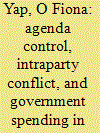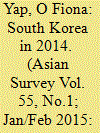|
|
|
Sort Order |
|
|
|
Items / Page
|
|
|
|
|
|
|
| Srl | Item |
| 1 |
ID:
068580


|
|
|
| 2 |
ID:
179265


|
|
|
|
|
| Summary/Abstract |
We adopt a game theory approach that considers democratization as the result of strategic interactions between government and nongovernment actors in East and Southeast Asia, and test the implications systematically with data from South Korea, Thailand, Taiwan, the Philippines, and Indonesia. This makes three contributions to scholarship. First, the synergy of a game theory framework based on area studies information draws attention to the conditions under which players’ threats or actions are credible, to support inclusive theory-building. Second, the consistent findings across East and Southeast Asian countries often cited as critical cases on opposite sides of larger debates in the discipline, and across different operationalizations of democratization, support the idea that democratization occurs under weak economic conditions. Third, our rigorous tests beyond regime change-over, and across empirically derived heuristics of time span, fill theoretical and empirical lapses in order to adjudicate democratization in the region and provide a clear theoretical and empirical lens for current and future analyses.
|
|
|
|
|
|
|
|
|
|
|
|
|
|
|
|
| 3 |
ID:
137908


|
|
|
|
|
| Summary/Abstract |
The Sewol ferry tragedy revealed weaknesses in South Korea’s politics, economy,
and society that had been sidestepped during economic development and political transition. The split in local elections, the Saenuri Party’s sweep in by-elections, and the installation of critics of President Park as leaders of the ruling party all underscore the public’s rejection of political stonewalling or politicking-as-usual.
|
|
|
|
|
|
|
|
|
|
|
|
|
|
|
|
| 4 |
ID:
159183


|
|
|
|
|
| Summary/Abstract |
When do citizens take costly collective action against government corruption? When citizens act in concert, their demands are credible and not easily discounted by governments, which should be more likely to respond. In this study, we use the stag-hunt game, supplemented by Granovetter's threshold model of collective action, to investigate the conditions under which citizens coordinate to collectively act against government corruption. We use survey experiments in laboratory settings in Australia, Singapore, and the United States. The results show several conditions motivate participants to pursue collective action; using the wellspring of the theoretical argument, they clarify that information that others pursue collective action, together with clear mutual benefits as measured by rewards, are primary motivators of the individual's choice. Correspondingly, other considerations, including initial costs or final potential penalties, do not bear on the individual's choice. The findings have implications not only for the empirical literature on policy but also for policy debates on how to control it.
|
|
|
|
|
|
|
|
|
|
|
|
|
|
|
|
|
|
|
|
|